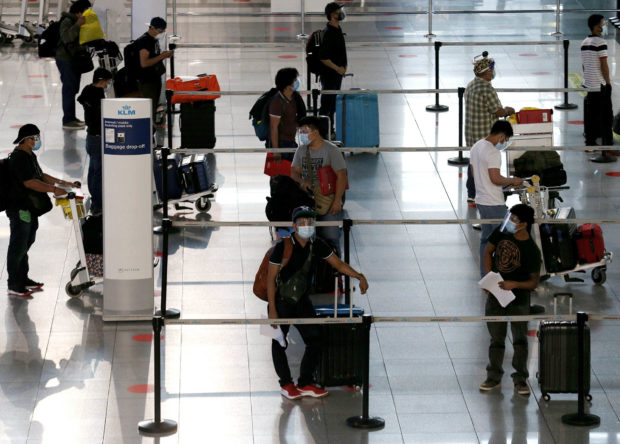
SAFETY GEAR Passengers wear masks and face shields at the check-in counter of Ninoy Aquino International Airport Terminal 3 in Pasay City. —RICHARD A. REYES
MANILA, Philippines — While the government will allow the nonessential outbound travel of Filipinos beginning Oct. 21, the Bureau of Immigration (BI) on Sunday stressed that restrictions on inbound travelers would remain in place.
Immigration Commissioner Jaime Morente said the agency was ready to comply with Resolution No. 79 of the Inter-Agency Task Force for the Management of Emerging Infectious Diseases (IATF) that eased departure restrictions for Filipino citizens.
“Outbound tourism is now allowed for Filipinos, subject to compliance with protocols set by the IATF,” Morente said in a statement.
The guidelines require that outbound Filipino travelers present a round-trip ticket, health and travel insurance, and a negative antigen test result within 24 hours before departure.
But, according to the ruling, if the country of destination requires an RT-PCR test, then the same must be presented instead.
Signed declaration
Departing Filipinos will also be required to sign a declaration acknowledging the risks of their travel, to be provided by airline check-in counters.
“After which, passengers will still undergo regular immigration assessment,” Morente said, adding that the BI is closely monitoring any changes in policy with regards to inbound restrictions.
Cabinet Secretary Karlo Nograles said on Saturday that the IATF was studying policies with regard to inbound travel, as the government recognizes that there are foreign citizens abroad who want to spend the holidays with their loved ones and fiancées here in the Philippines.
But Nograles said reuniting Filipinos with their families and loved ones overseas was the main reason why the government decided to allow nonessential outbound travel.
Currently, only Filipinos, their spouse and minor children are allowed to enter the country holding tourist visas. Restrictions allow the Filipinos’ foreign children with special needs, foreign parent of minor Filipinos, and foreign parent of Filipino children with special needs to enter the country.
Those who are eligible to enter are required to secure an entry visa from Philippine embassies or consulates, prior to their arrival.
Apart from said categories, accredited foreign government and international organization officials and their dependents, foreign airline crew members, foreign seafarers with 9(c) visas, and foreigners with long-term visas are also allowed to enter the country.
Nograles, cochair of the IATF, said it it might take time for the task force body to resolve matters brought to its attention as “every decision of the IATF has repercussions … and we have to prepare the ground.”
“We ask for your patience, we ask for your kind understanding. The government listens to all the concerns of our countrymen and works to find ways to address them,” Nograles said.
“These go through a process; but we assure you that we listen to and act on all your requests,” the Palace official added.
Nograles reminded prospective travelers that their country of destination may require a negative RT-PCR test and Philippine authorities would be required to get one.